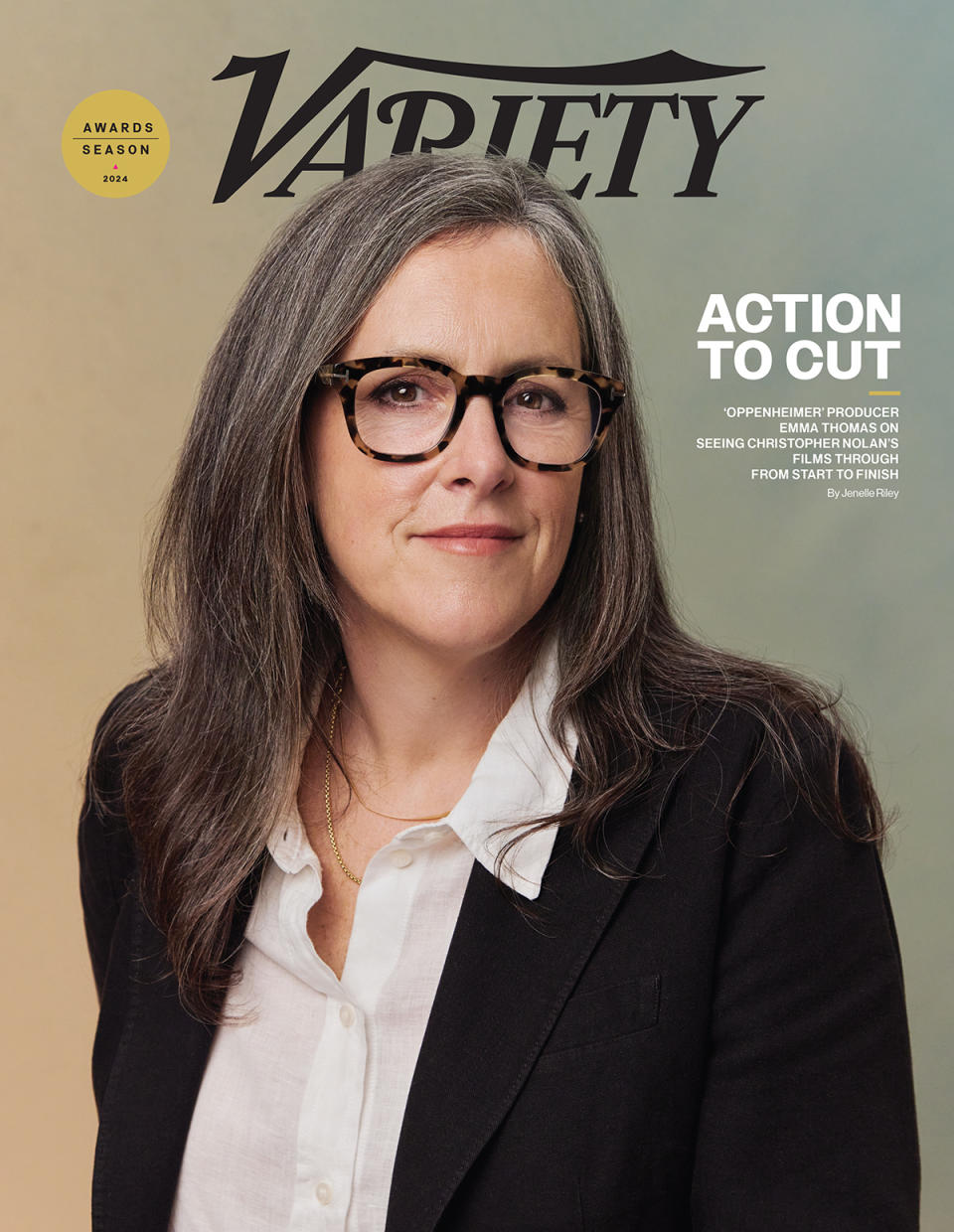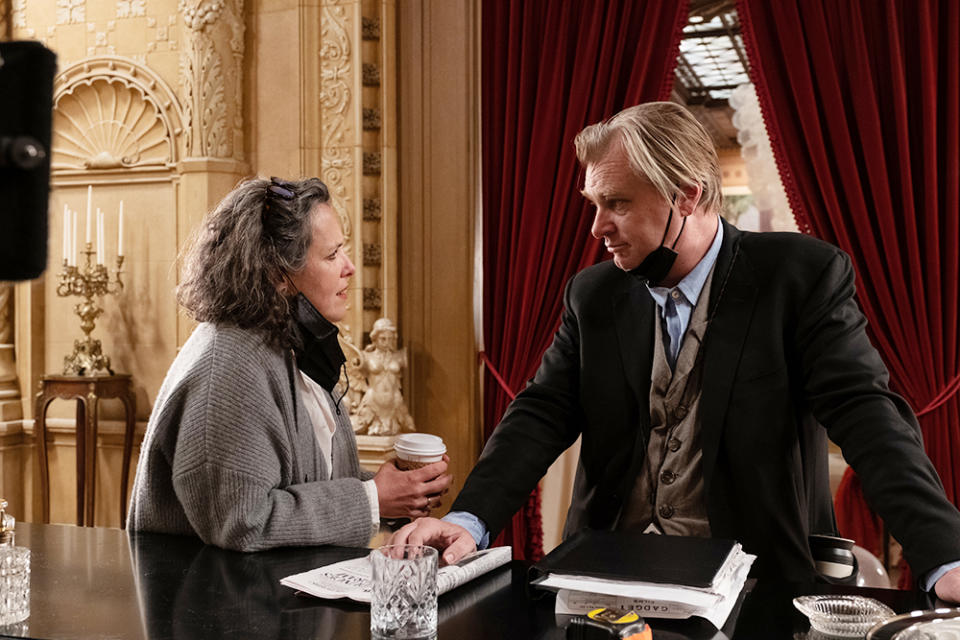‘Oppenheimer’ Producer Emma Thomas on the Biggest Misconceptions About Christopher Nolan and Why It’s the ‘Riskiest’ Film They’ve Made
- Oops!Something went wrong.Please try again later.
- Oops!Something went wrong.Please try again later.

Few producers can boast a track record — commercially and critically — like that of Emma Thomas.
She has served as the producer on every feature film directed by her husband Christopher Nolan, and these films have collectively accumulated more than $6 billion at the worldwide box office. Long before superheroes were hitting the theater every month, Thomas and Nolan made the genre respectable with “The Dark Knight” trilogy, a reboot of the DC staple that proved Batman could be both epic and grounded. Talent flocks to the pair and every movie becomes an event — even a three-hour biopic about a stoic scientist set primarily in classrooms, laboratories and government hearings. Add to that the fact her sets are notoriously harmonious, coming in on time and on budget, and Thomas is a dream producer for both talent and studio.
More from Variety
'Barbenheimer' Powered 2023 U.K., Ireland Box Office to $1.3 Billion, 24% Below Pre-Pandemic Levels
BAFTA Awards: 'Barbie,' 'Oppenheimer,' 'Killers of the Flower Moon' Lead Longlists in Three-Way Tie
So it’s interesting to learn that Thomas never intended to work in the movie business — she thought she would follow her father into the world of civil service. But her first week at University College London, she met Nolan. He introduced her to the college’s Film Society, which not only arranged screenings of movies but used the proceeds to make newsreels and short films. And Thomas was hooked.
Upon graduation, Thomas had “a very awkward lunch with my father” in which he plied her with brochures on civil service, but she stayed firm and went to work as an unpaid intern and runner for Working Title Films until a job as the receptionist opened. Her and Nolan’s first feature, 1998’s “Following,” was shot on weekends when friends were available on a budget estimated at $6,000.

Contrast that with their latest film, “Oppenheimer,” an epic that sprawls decades as it examines the life of J. Robert Oppenheimer, the theoretical physicist known as the “father of the atomic bomb.” Released at the height of summer, the film has grossed $954 million worldwide on a budget estimated at $100 million. Response has been rhapsodic, not just from critics but audiences. Praise has been heaped on the sweeping filmmaking and the use of practical effects — including a scene that re-creates the Trinity nuclear weapon test — and it’s easy to marvel at the spectacle. But as with all the pair’s films, equal credit is due to the heartfelt storytelling and the stellar performances of a superb ensemble that help make the movie an equally emotional experience.
The title of producer can encompass so much. At its core, what do you think the role of a good producer is?
That’s the interesting thing, because you can ask 10 different producers, and they will give you 10 different answers. You can also be a producer on 10 movies and do the job differently every time because that’s what the job requires.
I don’t know about others, but I know what I do; I work with Chris, so I fit what I do around what he needs, if that makes sense. The common thread between what I understand my friends who are producers do and what I do is that we are with a project from beginning to end. That is the one thing that is absolutely the key. It’s like we’re shepherding something from the beginning.
How does it work when he’s working on a project: Do you read a script in stages or want to come in pure when it’s done?
He’ll tell me what he’s working on, and he’ll tell me ideas, little things. But I don’t tend to read pages until there’s a full script. I think the only time it was different was on “Inception,” where he wrote like, 50 pages and then put it away for years. One of the reasons I like reading the whole script is that I’m trying to read it as an experience, rather than parceling it up. But sometimes it’s hard to be a pure reader because I’m thinking, “Oh my God, can we do this? What will that look like?” And on another level, I’m thinking, “This is what our life is going to look like for the next two years.”
When you first read “Oppenheimer” and got to the Trinity test, how much of you is purely enjoying how cool it is, and how much of you is in producer mode worried how you will pull it off?
I wasn’t actually worried about Trinity. Because we have an incredible crew. My biggest concern when I read “Oppenheimer” was how the film was going to come together as a cohesive whole. It’s not a film that’s easy to define; I knew he wanted to shoot a lot of it in black and white, and it was three hours — which I wasn’t really happy about. And I knew he wanted to release it in the summer, make it a big summer movie. So when I read the script my biggest worry was less logistics and more like how are we going to make this a big summer movie?

It’s interesting because many people assume it was a home run. You have a good track record, but I don’t know if they really understand how risky it was.
For me, “Oppenheimer” was definitely the riskiest film we have made — with the possible exception of “Inception,” which felt risky at the time. Even with Chris being who he is at this point, I didn’t feel there was a guaranteed audience for this film. I hoped people would feel they needed to see it in theaters, but many people still weren’t back post-COVID. And there’s the fact we’ve heard nothing but “theaters are over” for a while now. So it wasn’t a no-brainer. Not only did it feel like it was a risky film to make, it felt like the stakes had never been higher. So the fact we had such a good summer was more gratifying than anything.
You touched on the run time; was there ever discussions about cutting it down?
The problem was there was really no way you could cut it down. When you look at that book, there wasn’t any version of this film that wasn’t going to be three hours. When I first started moaning about it, Chris would say, “Well, you know … ‘The Avengers.’” And I kept on hearing that, so I just kept saying, “Avengers. Avengers.” I was very grateful that we had this Imax platform that we had; we couldn’t go any longer than three hours.
Really? It was the tech that kept you to three hours?
Yes. The first time we made film with Imax was “The Dark Knight,” and they then said it can be no longer than two and a half hours. They sort of extended it a little bit so it could be two hours and 42 minutes, or whatever it was. With this film, they put these additional brackets on and said, “Three hours, that’s it.” So I knew we were never going to be able to go longer than that.
You’re not only encouraging the theatrical experience, you are actually getting people to create new technologies for your movies.
It’s weird to me that the big new technology on this one was the black-and-white large format film. Until we started talking to David Keighley at Imax, I didn’t realize that hadn’t been done before. But that’s sort of the fun of making these films, pushing boundaries in whatever way that you can.
Your films are always praised for their visuals and technical achievements, but they also have these wonderful performances and ensembles. How much of the casting are you involved in, even down to the smaller roles?
Pretty much all of it. There are no half measures, really, on a Chris movie. We have an amazing casting director, John Papsidera, and we’re very involved. This one was particularly challenging as the cast is absolutely enormous. But it’s also a really fun part of the process. It’s usually happening at the same time when the rest of the prep is not fun, so casting is always a joy.
I imagine you have your choice of actors. Can you talk about someone like Josh Hartnett, who we haven’t seen as much of on screen — is he someone you’ve had your eye on for awhile?
We’ve always been big fans of his and Chris had actually met him a long time ago for “Batman.” And we were so grateful because this wasn’t easy — his role shot in four different locations, and he lives in England, and it was tricky with COVID. I just think he’s wonderful; it’s been so lovely seeing people respond to him. Because I feel he was doing something people haven’t seen him do, at least for a long time.
I’ve noticed your previous films frequently cast actors who found fame in the 1980s but haven’t been seen as much lately. I’m thinking of Anthony Michael Hall or Rutger Hauer.
On this one we had James Remar. Chris is always looking for the interesting faces that you haven’t necessarily seen for a while. And the great thing is these actors come to set completely prepared and having done their research. So he plays [Henry Stimson] the secretary of war and he has a line about not bombing Kyoto because “me and my wife went on our honeymoon there.” That wasn’t in the script, that was something he told us he found in his research. So we put it in there.
I felt bad for how hard I laughed at that line.
Yes, but it’s a shocked laugh. It drives home the banality and the futility and the awfulness of war and the crazy, random reasons that people do things that have a huge impact to normal people.
I don’t think Christopher Nolan films get enough credit for being funny. One of my favorite lines ever is in “Memento” when Guy Pearce realizes he’s being chased, not chasing someone.
I’m right there with you. Someone earlier asked me, “What do you think is Chris’ most underrated quality?” He’s funny! People think he’s dead serious, they accuse his films of also being so serious.
People forget the humor in “Batman Begins” there’s humor the first time we see the Batmobile.
Even in “Oppenheimer” there are moments I find funny, even in the actor’s expressions. There is humor in his movies, and I don’t think he gets enough credit for it. The other one I don’t get is people have said his movies are not emotional.
They use the word cold when I think they mean to praise the technology and the precision. But if you don’t cry when Cillian Murphy finds that pinwheel in “Inception,” something is wrong with you.
I think “Interstellar” is one of the most emotional films ever and he caught flack for it being cold. The thing about Chris’ films is there’s not much showboating. Everything lives for a reason — there’s nothing distracting. But sometimes that means that people mistake it for something less, like cold. Chris is an old softie, he really is.
Best of Variety
Sign up for Variety’s Newsletter. For the latest news, follow us on Facebook, Twitter, and Instagram.

